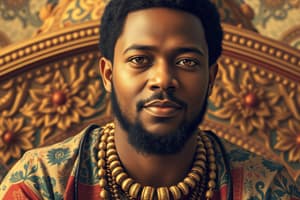Podcast
Questions and Answers
How old was Trevor when his mother told him to find his father?
How old was Trevor when his mother told him to find his father?
24
What does Robert think about marriage?
What does Robert think about marriage?
He says that people marry to control people.
Why weren't Trevor's parents caught?
Why weren't Trevor's parents caught?
His father was so private that he wasn't even listed in the phone book.
What do Patricia and Robert have in common?
What do Patricia and Robert have in common?
What was special about the restaurant that he opened?
What was special about the restaurant that he opened?
Why was the restaurant a success?
Why was the restaurant a success?
What were the names of some neighborhoods mentioned?
What were the names of some neighborhoods mentioned?
Why did Trevor love Christmas with his dad?
Why did Trevor love Christmas with his dad?
Why did Trevor move to Cape Town?
Why did Trevor move to Cape Town?
What is 'the curse of being coloured'?
What is 'the curse of being coloured'?
What was the pencil test?
What was the pencil test?
What did people in South Africa think about Hitler?
What did people in South Africa think about Hitler?
What were coloured people often called?
What were coloured people often called?
What did Trevor learn about life in the hood?
What did Trevor learn about life in the hood?
How many official languages does South Africa have?
How many official languages does South Africa have?
Study Notes
Family Dynamics
- Trevor's mother instructed him to find his father at age 24, emphasizing self-discovery and identity.
- Robert views marriage as a means of control and expresses a desire to avoid such constraints.
Parental Influence and Personal Identity
- Trevor's father maintained privacy, not listed in the phone book, contributing to his absence in Trevor's life.
- Both Patricia and Robert share a common hatred for racism and reject the norms of apartheid, favoring freedom over traditional marriage.
Trevor's Experiences with Race
- Trevor's mixed race led to feelings of isolation; he was rejected by both black and colored communities for differing reasons.
- He lived in a unique position where he could seem white on camera due to his appearance.
Cultural and Societal Observations
- Yeoville had a rich cultural scene with diverse restaurants and bars, highlighting the mixed racial makeup of the area.
- Trevor's experiences in neighborhoods like Sophiatown and Soweto taught him about the realities of segregation.
Unconventional Business Ventures
- Trevor's father's steakhouse broke racial barriers by being one of the first integrated restaurants in Johannesburg, gaining licenses for mixed clientele.
- Despite initial success, health-code violations and pressure from racists forced closure.
Understanding Apartheid and its Impact
- The apartheid system convinced colored people they were oppressed by black individuals, instilling a desire to assimilate into whiteness.
- The pencil test represented the absurdity of racial categorization, where hair texture determined race in a discriminatory society.
Trevor's Youth and Struggles
- Experiences in Soweto included a lack of freedom and pressure to fit into racial categories, leading to self-hatred.
- Exposed to crime yet attracted to community, Trevor navigated friendships and relationships amid societal pressures.
Reflections on History and Identity
- Trevor analyzed how apartheid drew inspiration from the Third Reich, linking global racial ideologies.
- He recognized the impact of historical figures on societal views, with surprising support for Hitler among some South Africans.
Lifestyle and Survival Strategies
- Trevor resorted to selling pirated CDs and DJing after high school to support his ambition of education and financial independence.
- Life in the hood provided affordability but also blurred the lines between lawful living and criminality.
Language and Adaptability
- Knowledge of multiple languages helped Trevor navigate various social situations, gaining acceptance in diverse environments.
- Adaptability was key for survival in a culturally complex and racially tense society.
Consequences of Race and Identity
- Trevor's experience highlighted the absurd contradictions of identity under apartheid, questioning who truly belongs where.
- He learned that crime thrived where government support was lacking, revealing another layer of society's struggles.
Studying That Suits You
Use AI to generate personalized quizzes and flashcards to suit your learning preferences.
Description
Explore key concepts and themes from chapters 8 and 9 of 'Born a Crime'. These flashcards will help reinforce your understanding of Trevor Noah's experiences and the insights shared in these chapters. Perfect for a quick review or self-testing.




